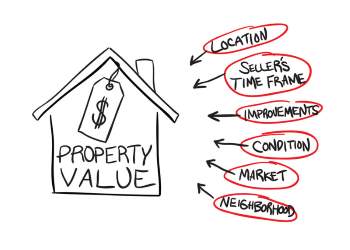Get an as-is cash offer for your home
"*" indicates required fields
If you have ever bought or sold a home, you’ve probably crossed your fingers waiting for the home appraisal. Sellers dread a home appraisal coming back at less than the agreed purchase price. On the other side, buyers may hope for a low appraisal so they can negotiate a cheaper price.
In this guide, we explore home appraisals. How does the home appraisal process work? What can hurt your home’s value? Lastly, we’ll look at what you can do if your home appraisal comes back lower than your purchase price.
What is an appraisal?
An appraisal is an “opinion of value”. This is according to the Appraisal Foundation, a group authorized by Congress to oversee each states appraiser regulator agency. 
Most people’s first encounter with appraisals happen when they request a loan to buy a house. However, there can be many reasons to order an appraisal. Sometimes appraisals are ordered by heirs trying to establish the value of an inherited property for tax purposes. The courts will also order home appraisals for probate. Additionally, attorneys will often order appraisals during litigation to determine equity. And of course, an appraisal can also be requested by a home seller. As a matter of habit, I will often order an appraisal prior to listing one of our flips on the market.
Why are home appraisals important?
From a homeowners perspective, an appraisal helps you get an independent estimate of your home’s value. From a lender’s perspective, it’s a safety net. It lets the lender know that the property is worth at least as much as the loan amount. In the case of litigation or divorce, a home appraisal helps establish if there is any equity in the property.
Scott Loyer of Connect Appraisals states, “appraisals are important [to lenders] because they provide a check on the banks, realtors and homeowners who are trying to get the most money for their home…. and allows the banks to lend on properties with confidence.”
Appraisals, AVMs, Zillow and iBuyers
It’s not uncommon for homeowners to use an Automated Valuation Model (AVM) like Zillow to determine their home’s value. AVMs use data analytics to create an estimate of value. While AVMs can be a great tool, it’s important to remember that they’re only a tool. Mason Spurgeon, an appraiser with Spurgeon Appraisals in Fayette, Missouri states “An AVM is a great tool and should definitely only be used as a tool, not as a replacement for appraisals.”
“An AVM is a great tool and should definitely only be used as a tool, not as a replacement for appraisals.” – Mason Spurgeon
AVM’s gather large amounts of data from County records and the Multiple Listing Service. Using complex computer formulas, they then estimate the value of your home. Zillow, OpenDoor, and other iBuyers offer to buy your home using these AVMs. However, AVMs require a lot of data to be accurate. AVMs have a difficult time with estimating value for properties that aren’t identical. Additionally, the more expensive your home is, the easier even a slight error can make a big difference in estimating the value of your home can make. This is why most iBuyer’s won’t buy homes worth more than $500,000.
Spurgeon says, “In rural markets and with unique or older properties the AVM’s have a hard time returning accurate values because of the lack of sales data. An appraiser, on the other hand, can analyze a smaller amount of sales data and determine a fair market value.”
If your home is not cookie cutter, or has significant upgrades, you’re better off using an appraiser to determine your home’s value.
How long does a home appraisal take?
Most appraisals can be completed and returned to the client within two or three days. However, due to high demand for refinancing, it may take several days to weeks for an appraiser to have an available time slot.
What do appraisers look for?
When most people estimate their home’s value, they start with the size of the home and the number of bedrooms. They may even tell you about what’s different about their house than the one that sold down the street.
But an appraiser will look at much more than that. Rachel Massey, an appraiser with Massey & Associates Valuation Services outside of Ann Arbor Michigan states, “We look for the overall condition, size, the various amenities, quality of construction, location, and views. We’ll look for anything that would drive a buyer to chose the particular property. Basically the way a buyer looks at a property.”
“An appraiser looks at a property, the way a buyer looks at a property.” – Rachel Massey
Later, in this article, I’ll give you some great suggestions of what you should be pointing out to the appraiser to help your appraised value.
What hurts home appraisals?
There are several things that can negatively affect your home’s appraisal. Most notably is location. Everyone has heard the three rules of real estate – location, location, location. That’s because it’s true. Homes near busy roads, commercial or industrial areas, even flood or fire zones can negatively impact your home’s value.
Homes near busy roads, commercial or industrial areas can negatively impact your home’s value.
Additionally, not having features that are popular, or even considered “required” by buyers can also affect your home’s value.
For instance, in some cities a pool may be an absolute necessity. What if the majority of buyers are looking for a home with a pool? If your home does not not have a pool, it may negatively impact the value. On the other hand, what if you live in an area where pools are nice, but not a must have? In that case, having a swimming pool probably won’t add any value.
How the home appraisal process works
Consumers see only a small portion of the appraisal process. Typically consumers see the appraiser when they visit the property. However, they do not see the process that the appraiser goes through in developing their opinion of value.
What’s the purpose of the appraisal?
Appraisers start with identifying the problem. Is this for a home loan? Or is does the appraiser need to establish the value of a multi-family housing complex based on the income the property produces? It might be to establish the value of a property at a time in the past.
For example, let’s assume you inherited a property several years ago that you kept as a rental. Now, you are thinking of selling the property. You might order an appraisal to determine your tax basis for depreciation recapture when you resell your rental.
Who’s the client?
As mentioned before, clients can be lenders, attorneys in litigation or consumers. In a mortgage financing transaction, the client is the lender, NOT the borrower. This is important to remember, especially, because it is typically the borrower paying for the appraisal. Just because the borrower is willing to pay more for a home, doesn’t make the home worth more if the bank has to foreclose.
In a mortgage financing transaction, the client is the lender, NOT the borrower.
What information needs to be gathered?
After considering the above factors and possibly others, the appraiser then determines what information they need to estimate the value of the home.
Do they need to visit the property? How detailed of an observation do they need to make? What types of sources are they going to consult in their research? Will they use the MLS, or county records? Do they need to call the agents of previous listings to determine the condition of a property that was sold? These all form the scope of work for the appraiser.
Determining Value
After collecting all of this information, it’s time for the appraiser to analyze the data. The appraiser’s job is to study the data and determine the value of the home. To help them accurately determine the value, the appraiser will typically use multiple approaches. By using multiple methods to estimate value , the appraiser can compare the results between each method and verify or correct their results.
A typical home loan might include using a comparable Sales Approach, comparing local area home sales. It might also use a Cost Approach, using the actual cost to rebuild your home. And if the property is a rental property, they might use an Income Approach that determines the value based on the income the property produces.
The Final Appraisal Report
The final step in the process is the report. This is where all of the analysis that took place comes together. It is the appraiser’s conclusions.
Ideally the report should take the client on a journey. It should help them understand how the appraiser looked at the data, and how they came to their conclusion. Even if the client does not agree with the results in the end, they should always be able to understand how the appraiser got to their conclusion.
Sellers will only see the appraisal if the value is low
Keep in mind that most sellers never see the appraisal report. Why? Technically the buyer is the one who paid for it, so it belongs to the buyer. Unless a seller requires a copy of the appraisal to be provided to them as part of the initial purchase contract, it’s unlikely the buyer’s agent will provide it. Typically, the buyer’s agent will only say, “The appraisal came in at the purchase price”.
If the appraised value comes in higher than the purchase price, the buyer’s agent doesn’t want the seller seeing it. However, if the appraised value comes in lower than the purchase price, you can bet the buyer’s agent will bend over backwards to give you a copy! It’s all part of the negotiating game agents play.
Is there anything a seller can do to increase the appraisal’s value?
Generally, what improves value is to maintain a property in good condition. Because appraisers evaluate the condition and construction of your home, it pays to maintain your home. Don’t let small leaks go without correcting them. Keep your home painted, and make repairs as soon as possible to prevent further damage.
However, there are things you can do to help your appraiser possibly justify a higher value.
Put together a list of upgrades
When an appraiser comes to your home, they may not know what major upgrades you have recently performed. I mentioned before that I almost always hire an appraiser for our flips. The first question they always asks me is, “What improvements have you done?”.
Rachel Massey says, “I really appreciate it when homeowners put together lists of major repairs and improvements they made and the approximate year the work was completed.”
Just to be clear, major upgrades include items such as new windows, new roof, HVAC, electrical system upgrades, hardwood flooring, kitchen and bath remodels. It does not mean minor items such as swapping out switch plate covers and painting one or two rooms. Since I’m a rehabber, I always have a laundry list of big ticket items that we have done to improve the home’s value.
I made the mistake recently of not providing a list to an appraiser. Due to COVID-19 lockdown, I didn’t meet the appraiser at a property with a list of upgrades we had performed. The appraiser used a flipped house in the neighborhood as a comparable sale. However, they incorrectly assumed that the flipped home was worth $10,000 more because it had been remodeled and wasn’t aware of the remodeling we did. Sadly, he didn’t ask us, because we had done a full remodel just two years earlier.
Additional information you should provide an appraiser
By the time the appraiser arrives at your home, they have already done quite a bit of research. They may have already selected a list of similar homes in your neighborhood to potentially use as comparables or comps. To save time, the appraiser will usually drive by all of the homes they’ll be using for comparable sales while they’re in your neighborhood. This can be a great time to communicate with the appraiser any houses they should consider. Additionally, if you have any information regarding houses in the neighborhood, be sure to let them know.
For instance, if you have information such as why a particular house sold below market, let the appraiser know. I’ve even had my real estate agent meet the appraiser at the house to provide them with our own list of comparable sales. Of course, the appraiser doesn’t have an obligation to use your information. However, they can at least evaluate if your information should be included in their estimate of value.
What happens when a home appraisal is low?
Most appraisers would not say that an appraisal came in “low” . Instead, they would say “the sales price was unsupported”. This happens sometimes due to circumstances such as a shortage of housing inventory. This requires us ask the question of what is market value?
What is market value?
For example, what if sellers remove their listings due to the COVID-19 crisis, and not wanting strangers traipsing through their home? At the same time, there are buyers who are in the process of taking a new job, and now have very limited options. If there is only one house on the market for every ten buyers, it is easy to see how bidding wars could start.
Is this a market sale? An appraiser would argue that market value assumes that buyers and sellers are working in their own best interests. And require that neither are subject to undue influence. However, the buyer in this instance may well be operating under undue influence.
As a home seller and non appraiser, I take a slightly different position. I would propose that value is determined by a willing seller and a willing buyer, both of whom are working in their own best interest. However, this is only true for all cash buyers.
Let me explain. I’ve had buyers without any money write offers for $30,000 over asking price. But since they are borrowing all of the money, price doesn’t matter to them. It goes back to remembering who the client is. In most home purchases, the client is the lender.
Lastly, remember, that an appraisal is “an opinion of value”. It’s possible for two different appraisers to evaluate a house and be arrive at different numbers. Hopefully they’re within 5% of each other, but not always.
How do market conditions affect appraisals?
Appraisers also need to account for changing market conditions such as rising home prices. A typical home appraisal will include comments or adjustments for what is currently impacting the market prices. This might include a large number of foreclosures, or limited supply of homes. Or, they may simply say “The market is stable”.
Let’s use the previous example, where we have limited inventory. We’ll assume for sake of argument, that all of the previous sales were for $100,000, give or take a few thousand dollars.
However, what if ten buyers are scrambling for the only house on the market and it sells for $110,000? Is that market value? Or is that the result of a bidding war? While a bidding war may benefit the seller, it’s not likely to affect the appraisal. In this case, the buyer would need to be willing to come out of pocket for the additional amount. If not, your buyer may not be able to get a mortgage for your home.
Can a low appraisal be challenged?
Yes, an appraisal that comes in less than the purchase price can be challenged. But only for verifiable errors of omission or competency.
The appraiser from out of town
During the Great Recession, an appraiser from a city several hours away performed the appraisal for the buyer of one of our flips. The appraiser was not familiar with the city, and they should have turned down the job, but didn’t. Unfortunately, because of the appraiser’s lack of competency in our local market, their valuation was substantially incorrect.
It almost killed our deal! My real estate agent contacted the Appraisal Management Company (AMC) and requested that they send a local appraiser to reappraise the property. Fortunately for us, the second appraiser’s value came in at our agreed upon contract price for the sale of the home.
Note, we didn’t challenge the appraisal just because they were from out of town. You can be from out of town, and intimately familiar with a neighborhood. We challenged the appraisal because in this specific situation, the appraiser didn’t have sufficient knowledge of the local market and omitted sales they should have included.
Reconsideration of Value
A request to review or change an appraisal is called a request for “reconsideration of value”. Your request must include verifiable and reliable data, not simply that you don’t like the valuation. This might mean comparable homes sales that the appraiser did not include. It might also mean pointing out sales the appraiser included that are outside of the neighborhood, when similar homes closer in proximity are available.
Sometimes an appraiser misses a viable and reasonable comparable sale, simply by using incorrect search parameters in their analysis. For instance, an appraiser might miss a sale that wasn’t reported as Sold in the MLS. Or, they may have missed a private transaction in the neighborhood that would only be visible in County records. Sometimes appraisers even miss rooms, such as a bathroom under the stairwell that looked like a coat closet. These are legitimate issues that can be challenged.
Additionally, appraisers may not be familiar with the local area, as in our previous example. As a result, their research can be incomplete, or have substantial errors of omission. When this happens, you need to contact the Appraisal Management Company (not the appraiser) immediately and request a reconsideration. However, keep in mind that any request for reconsideration may push the close of your escrow out further.
Lastly, if you suspect additional issues, competency or ethics violations, hire another appraiser to review the appraisal. If there are problems, they can also submit your request for reconsideration of value and address the major errors in the previous appraisal.
Conclusion
Well there you have it. That’s quite a bit of information to digest. Remembering, to keep up on your regular home maintenance and don’t let problems drag on, is one of the best ways to maintain your home’s value. When you perform significant upgrades, keep a list along with their costs, so that when you do sell, you can provide this to appraiser. And lastly, remember an AVM is no substitute for an appraiser.
I’d like to give special thanks to Rachel Massey of Massey & Associates Valuation Services for her help in writing this article.


